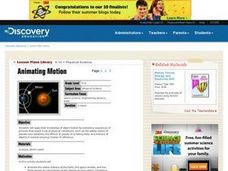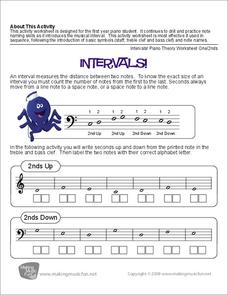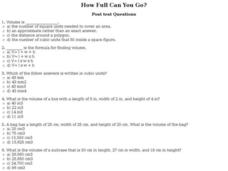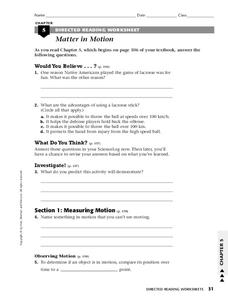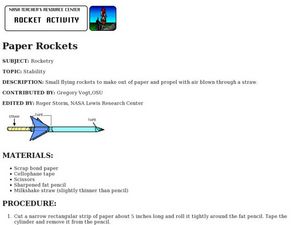Curated OER
WebQuest Solar System Colonization Project 2000
Sixth graders investigate the livability of different planets in the universe by researching and organizing information from a number of sources in this unit project. They decide on a location for a space station which they support in an...
Curated OER
Astronomical Scales
Young scholars describe the different units of measurement. In this space science lesson, students calculate astronomical distances using a scale. They explain the significance of using scientific notation in expressing very small or...
Curated OER
How Far Away is SOHO?
Students create a scale model of the Earth and the sun that demonstrates where the SOHO satellite is in relation to the Earth.
Curated OER
Domino Dash
Eighth graders examine the relationship between speed, time and distance. In this motion lesson students complete a lab activity that allows them to calculate average speed.
Curated OER
Out of This World
Middle schoolers take a mission to Mars. In this space science lesson, students listen a lecture about space travel to Mars and the planet itself. Middle schoolers then create timelines of exploration and write poetry about their ideal...
Curated OER
Design an Apartment
Students are given the task of designing an apartment. In groups, they practice estimating the area and perimeter of different shapes. After designing their space, they apply the same formulas to solving real-world story problems.
Curated OER
Animating Motion
Pupils apply what they recall about objects in motion by animati ng sequences of pictures that model a set of physical conditions. They animate the orbital motions of the Earth, the space shuttle, and the Moon based on calculations of...
Curated OER
Create your own thermometer
Students participate in an activity where they build a calibrated thermometer. In this thermometer lesson students complete this activity and take notes.
Curated OER
Find It!
Students analyze the basic concept of Global Positioning Systems using triangulation and measurement on a small scale in the classroom. They describe a satellite and how it helps in locating a person on Earth. They explain how...
Curated OER
Atmospheric Shielding from Radiation I
In this radiation worksheet, students calculate the distance of a satellite in orbit to determine the placement of a radiation detection device. This worksheet has 2 problems to solve.
MakingMusicFun.net
Intervals! (Seconds) | Free Music Theory Worksheet (Digital Print)
In this music intervals worksheet, students learn the exact size of an interval by counting the number of notes from the first to the last. They write seconds up and down from the printed note in the treble and bass clef. Then, they...
Curated OER
Volume: How Full Can You Go?
In this volume: how full can you go worksheet, students interactively answer 10 multiple choice questions about volume in both metric and standard measure, then click to check their answers.
Curated OER
Water and Ice
Young scholars investigate how water goes from a solid to a liquid then back again. In this experimental lesson students conduct their own experiment and see how water changes form.
Curated OER
What Wavelength Was That?
A combination of informative text, photos, and graphics comprise this sharp show on electromagnetic radiation. Some slides mention hands-on activities for demonstrating concepts, so if you want to include them you will need to figure out...
Curated OER
A Lunar Transit of the Sun from Space
In this moon activity, students determine the angular size of the moon and draw a scaled model of the Earth, moon, and sun and given distances and positions. This activity has 4 problems to solve.
Curated OER
Measuring Elevation
Students practice measuring elevation, one of the key coordinates used by astronomers. They describe how the elevation of an object is measured.
and combine compass directions and elevation to find celestial objects.
Curated OER
Matter in Motion
In this matter in motion learning exercise, students answer the provided questions as it relates to motion, speed, velocity, and acceleration. Students mark given statements as either true or false.
Curated OER
Design Your Space
Students evaluate the acceptable use of classroom space. The class participated in a brief lecture and discuss of floor plans and how they are used in architecture. Using graph paper, they create a scale drawing of the classroom...
Curated OER
I'm Not In Range
Students discover how cell phone service works while participating in a role play activity. They identify its advantages and disadvantages based on service. They examine how engineers use this information to develop better...
Curated OER
How Big is an Oil Tanker
Learners measure out 100 feet to get an idea of how long an oil tanker is. In this measurement lesson, students sketch an oil tanker using the appropriate scale, after they have an idea of how large an actual oil tanker is.
Curated OER
How Far...How Powerful
Young scholars explore the concept of gamma ray bursts. They examine basic physics concepts about light, measure the shifts of spectral lines, and utilize Hubble's Law to deduce the velocity of an astronomical object.
Curated OER
Gravity Exploration
In this space activity, students complete each of the statements related to weight on the moon. Then they create three questions that could be answered after completing the lab activity.
Curated OER
Paper Rockets
Students design, construct, and fly paper rockets that travel the greatest distance possible across a floor model of the solar system. They construct small flying rockets out of paper and propel them by blowing air through a straw.
Curated OER
Rocket Car
Students construct a balloon-powered rocket car from a Styrofoam tray, pins, tape, and a flexible straw, and test it along a measured track on the floor. They experiment with ways of increasing the distance the rocket car travels.








